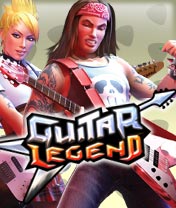Sponsored Feature: Guitar Legend
We get a backstage pass to the development secrets of Gameloft's axe epic

As you'll know if you read our review, we're big fans of Gameloft's Guitar Legend, which came out last week. The game has you working your way up the greasy rawk pole to become a stadium-pleasuring megastar through the power of hot riffs alone.
It's also got one of the best soundtracks of any mobile game, starring the likes of Deep Purple, Nirvana, Bloc Party and Iron Maiden. Simply time your button presses with the notes that flow down your guitar neck, and you'll play along with their hits, racking up money and glory.
Few people would have expected this kind of music-rhythm game to work well on mobile, given that you need a dedicated controller to play these guitar games on console. But that wasn't the only obstacle, as the game's producer, Manuel Figeac, explains.
"Many people were convinced that making a good music game on a mobile phone couldn't be done because the inputs are too different, the sound quality is bad, and there's not enough memory space," he says. "So there were plenty of different challenges."
Gameloft actually spent hundreds of hours testing as many phones as possible before even developing the game, to try and get the kinks ironed out (not The Kinks, obviously) and ensure the game worked well on as wide a base as time allowed.
"We've tried everything possible to make the most of each handset in terms of sound and playability, so we can deliver the best possible result for each version of the game," says Figeac.
Which sounds like hard work. We imagine it was more fun choosing which songs should feature in the game, although whittling it down to eight must have been as gigantic a struggle. How did Gameloft manage such a seemingly impossible feat? Figeac says the key was finding songs that would appeal to everyone.
"'Smoke On The Water' because it has one of the most famous riffs in the world, 'Banquet' because we think in 20 years, people will still headbang and dance to it, and 'Rock You Like a Hurricane' and 'Run To The Hills' because you can't make a rock game without including solid '80s heavy metal," he reasons.
"Basically, each song was handpicked to build the best possible track list and fit the eclectic tastes of the majority of players."
We were impressed by the sound quality in Guitar Legend, too. Half-expecting plinky-plonky polyphonic tunes, we were pleasantly surprised to hear much fuller sounding music. How did that work?
"It was one of the biggest challenges," admits Figeac. "They are polyphonic tunes; it's just that when you fine tune them over and over again, you get a much better result than your average downloadable ringtone."
We're still grappling with the ninja-hard highest difficulty level in the game, which sees you switch from three to five keys to play songs. And seeing as we had Figeac answering questions, we thought we'd get some tips. How the devil can we master the Expert mode and ascend to our rightful status as axe-tastic rock gods?
"Practice, practice, practice!" he offers before, thankfully, expanding his answer. "Most importantly, don't try to rush. Play the game level by level, don't try the Expert modes before you've mastered all the other modes and earned at least four or five stars everywhere else. Keep in mind that the first use of the four and five buttons come quite late in the game."
Right, we're getting to work. But before we do, one last question. Assuming Guitar Legend sells well, and there's a follow-up, what bands can we expect to see strutting their stuff in the sequel? We've got a list encompassing everyone from The Darkness, Kasabian and Jimi Hendrix through to Motorhead and Rage Against The Machine, but what does Gameloft think?
"The list is huge," says Figeac. "Many, many bands would be great in this game, but we still haven't decided what will be the theme of our next game. So, stay tuned…"
Not played Guitar Legend yet? Try the free demo!